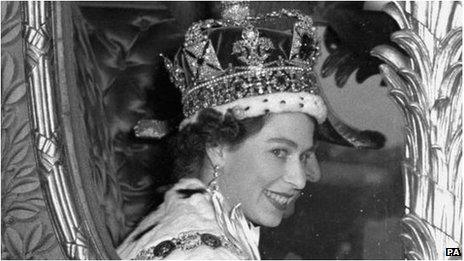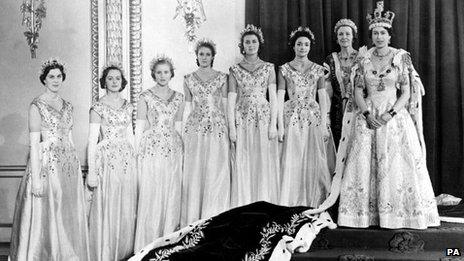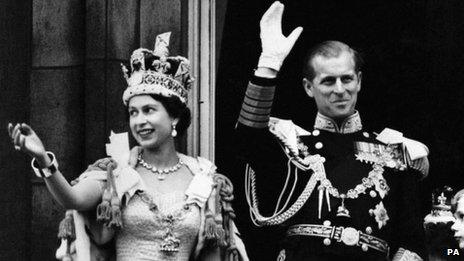Coronation 60th anniversary: 'Dazzling spectacle' remembered
- Published

The Queen swore her Coronation oath on 2 June 1953
It was a dazzling spectacle with solemn pledges and soaring music.
It brought together a cast of characters, the like of which had not been seen since the days of Britain's imperial glory.
Yet for all its splendour and pageantry, the coronation of a British monarch is really a rather curious event.
Strictly speaking it has no legal or constitutional significance. A king or queen is a fully-empowered sovereign from the moment of his or her predecessor's death.
But it can, and usually does, have a deep spiritual significance to the person being crowned.
Remember, a British head of state is not "sworn-in" by a senior judge or - perish the thought - by some superannuated politician.
Only royal oath
The people who have always presided at the Coronation are religious figures, the most senior clergymen - and they are still men - from the Church of England.
Lady Glenconner shares her memories of being one of the Queen's maids of honour with Luisa Baldini
Above all, the Coronation is a religious event - a service which represents the consecration of the king or queen to a lifetime of service to his or her people.
That was its overwhelming significance to the young Elizabeth when, on 2 June 1953 she stood within the ancient walls of Westminster Abbey, where kings and queens have been crowned for nearly a thousand years, to be anointed with holy oil and pledge herself in the face of God to fulfil the role to which the hereditary vagaries of the British monarchy had drawn her.
Guided by the Archbishop of Canterbury, she swore her Coronation oath. It is the only oath that a British head of state enters into.
That and, above all, the sacred nature of the entire event is the principal reason why Queen Elizabeth II will never abdicate. She believes deeply that the events of that coronation day set her apart and that hers is a duty from which only death can release her.
Sixty years on from the Coronation, the idea of a "sacred duty" which lasts a lifetime may seem to some, perhaps even to many, to be something of an anachronism. The coronation service may sound like some ancient tribal ritual and, in many senses of course, that is precisely what it is.
It is entirely symbolic, but it is a powerful, sacred symbolism which mattered deeply then - and continues to matter deeply now - to the woman who occupies the British throne.
Future ceremony
Ten years ago, at the service marking the 50th anniversary of her coronation, it is said that someone from Westminster Abbey suggested to the Queen that she might like to retake her Coronation vows.

The newly-crowned Queen is seen here with her maids of honour
The Queen, it is said, was having none of it. Those vows were very personal. They were taken once. They would last a lifetime. They were not the sort of thing to be reprised. The idea was dropped.
In matters such as these the Queen has an unashamedly traditional perspective. Her coronation service contained many elements which would have changed little since the first coronation that took place in an abbey church by the river Thames at Westminster.
That was on Christmas Day 1066, when William the Conqueror was crowned.
But that is not to say that the form of the Coronation service will not change in the future. It hardly needs to be said that the United Kingdom of 2013 is a very different nation to that of 1953.
Discussions have already taken place, very discreetly, about how the next Coronation should look and sound. The views of both the Church of England and the man who would expect to be the central character in that service, Prince Charles, the heir to the British throne, have been canvassed.
The Church of England is anxious to protect its position as the country's "established Church", a position which carries with it the responsibility of both constructing and conducting the Coronation service.
Faith presence
Nonetheless, there would appear to be a recognition that the Church of England cannot now alone represent the different Churches - to say nothing of the different faiths - of the United Kingdom and the other nations of which the British monarch is also head of state.

The Queen and Prince Philip later appeared on Buckingham Palace's balcony
In 1953 the Coronation was an almost exclusively Church of England production.
Just one other Church, the Church of Scotland, was permitted to have one representative at the service who presented the Queen with a Bible. Sixty years later it is accepted that the Church of England will have to be very much more hospitable.
That means that the next Coronation, whenever it comes, will need better to reflect the spiritual diversity of today's Britain. It will still be a Christian service conducted by the Church of England's most senior churchmen - or might even, conceivably, by then include a churchwoman.
A Coronation is essentially a moment of profound symbolism. It is the joining of the monarch in service to his or her people.
And so the next time an Archbishop of Canterbury lowers St Edward's Crown onto the head of a British monarch, we can expect representatives of those people, in all their diversity, to be in much closer and more visible attendance.
- Published31 May 2013
- Published30 May 2013
- Published30 May 2013